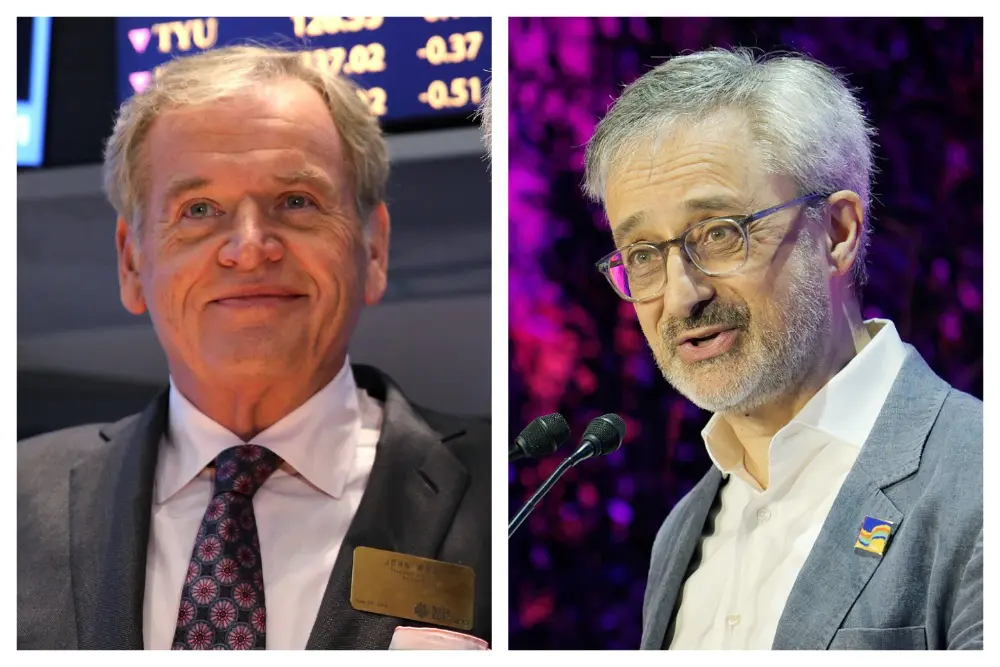Top executives from Omnicom Group and Interpublic Group made a case Monday for a proposed merger of ad-industry giants that would create a company that exceeds the size of two main rivals and is better equipped to handle some of the big challenges facing the industry in the not-too-distant future.
In era when creating content that gets passed along to consumers in viral fashion is easier than ever thanks to artificial intelligence, said John Wren, Omnicom’s CEO, “every company in our business needs to make investments to stay at the cutting edge of that.” Advertisers increasingly need real-time data about how commercials are performing and how consumers are reacting to them, said Philippe Krakowsky, Interpublic’s CEO, and a combined entity will be better able to provide all of that.
Omnicom and Interpublic have proposed an all-stock transaction that they say will generate cost synergies of $750 million within two years of the close of a deal, which could be consummated in 2025. At close, Omnicom shareholders will own 60.6% of the combined company and Interpublic shareholders will own 39.4%. Wren will remain chairman and CEO of Omnicom, while Interpublic CEO Philippe Kraskowsky will serve as a co-president and co-COO of Omnicom, along with Daryl Simm. Three current members of the Interpublic Board of Directors, including Kraskowsky, will join the Omnicom board.
Popular on Variety The combined company is expected to be larger than the other two big rivals in the sector, France’s Publicis Groupe and WPP of the U.K. And it will create an industry behemoth that will hold more sway not only with advertisers but with media companies and digital publishers who rely on ad revenue to fuel their activities.
Interpublic has built up an expertise in ad-tech and using data to help guide placement of ads that Omnicom could utilize, while Omnicom has longstanding relationships with blue-chip marketers such as PepsiCo and Apple, and houses units such as BBDO, TBWA Worldwide and Omnicom Media Group. While it has only infrequently been seen as blazing new frontiers in digital practices, it closed a deal in January to buy Flywheel, a specialist in digital commerce.
“What attracted me to this transaction” wasn’t cost synergies, said Wren, but the “revenue possibilities” that might come thanks to new skills and capabilities, as well as an ability to invest for the future.
“The impetus on our side was always strategic,” said Krakowsky. “The idea was where’s the industry moving to, how can we drive growth, how can we bring clients a portfolio” that’s most impressive and has meaningful benefits.
Yet they may also be moving together to head off the potential for future destabilization. The merger of “these two fierce competitors” represents “an indication that the industry needs to both reduce capacity to lower the competitive margin pressures around new business pitches and dramatically reduce cost
structures and the number of under-performing agencies,:” said Michael Nathanson, an analyst with MoffettNathanson, in a research note. “It feels like we are on the precipice of significant secular changes.”
Analysts see a new world in which data mining and greater control over ad distribution and placement becomes more critical than maintaining traditional creative agencies. Indeed, in recent months, Interpublic has moved to sell some of its best-known agency holdings, including the New York office of Deutsch and Hill Holliday. There could be more work in the future to streamline some of the new company’s agency networks. “Arguably no holding company needs five creative agency brands,” said Brian Wieser, an independent industry analyst, in a research note. “At the same time, efforts to reduce brands introduce risks around talent and client retention.”
Omnicom attempted a merger with Publicis about a decade ago, and failed. During Monday’s call, Omnicom’s Wren suggested the executive teams of Omnicom and Interpublic had more commonality in corporate culture, and vowed the deal would succeed. “The lessons learned a decade ago are not going to be repeated,” he said.
More to come…

 Italian
Italian







